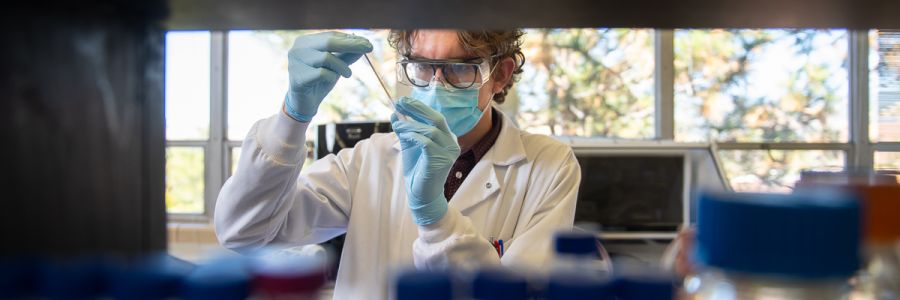Graduate Programs
Faculty in the Department of Biomedical & Pharmaceutical Sciences are affiliated with the three graduate programs described below. Pharmaceutical Sciences & Drug Design and Toxicology are administrated by the Department, while Neuroscience is administrated by the Division of Biological Sciences. All of these graduate programs are coordinated through the .
Pharmaceutical Sciences & Drug Design

The Graduate Program in Pharmaceutical Sciences and Drug Design provides advanced training in basic, translational, and clinical research within the pharmaceutical sciences. Students receive training at the interfaces of medicinal chemistry, molecular pharmacology, pharmacokinetics, pharmacogenomics, and toxicology. The program offers M.S. and Ph.D. degrees to develop pharmaceutical scientists for careers in the academia, pharmaceutical and biotechnology industries, as well as governmental agencies. Active area of investigation include designing and developing of novel therapeutics, exploiting small molecules to understand protein structure and function, identifying drug targets and biomarkers of disease pathogenesis and progression, and optimizing therapies to improve efficacy and safety through the use of genomics and precision medicine.
Toxicology
 The Toxicology Graduate Program brings together faculty from across campus that share a common interest in improving human health through a better understanding of the impacts that environmental agents have in causing or exacerbating disease. The Center for Environmental Health Sciences plays an integral role in the Toxicology Graduate Program, which offers both M.S. and Ph.D. degrees. Research interests of the Toxicology faculty include investigating the role of environmental toxins on: mechanisms of pulmonary and cardiovascular disease, immune and autoimmune disorders, developmental defects, neurodegenerative diseases, and genetic susceptibility. Many of these projects share an interest in the role of acute and chronic inflammation as the driver for most human diseases.
The Toxicology Graduate Program brings together faculty from across campus that share a common interest in improving human health through a better understanding of the impacts that environmental agents have in causing or exacerbating disease. The Center for Environmental Health Sciences plays an integral role in the Toxicology Graduate Program, which offers both M.S. and Ph.D. degrees. Research interests of the Toxicology faculty include investigating the role of environmental toxins on: mechanisms of pulmonary and cardiovascular disease, immune and autoimmune disorders, developmental defects, neurodegenerative diseases, and genetic susceptibility. Many of these projects share an interest in the role of acute and chronic inflammation as the driver for most human diseases.

Faculty from multiple departments and colleges have joined together to offer exciting opportunities for training and research that is relevant to understanding the structure and function of the central nervous system, as well as how it is altered in neurological and neurodegenerative diseases. Graduate students in the may obtain M.S. and Ph.D. degrees and work with faculty from a number of campus departments. Neuroscience faculty study the molecular physiology of transporters and receptors, signal transduction mechanisms in normal and injured neurons, neurodegenerative pathways, cellular mechanisms of secretion, cell differentiation, cancers of the CNS, and the neural basis of behavior.
